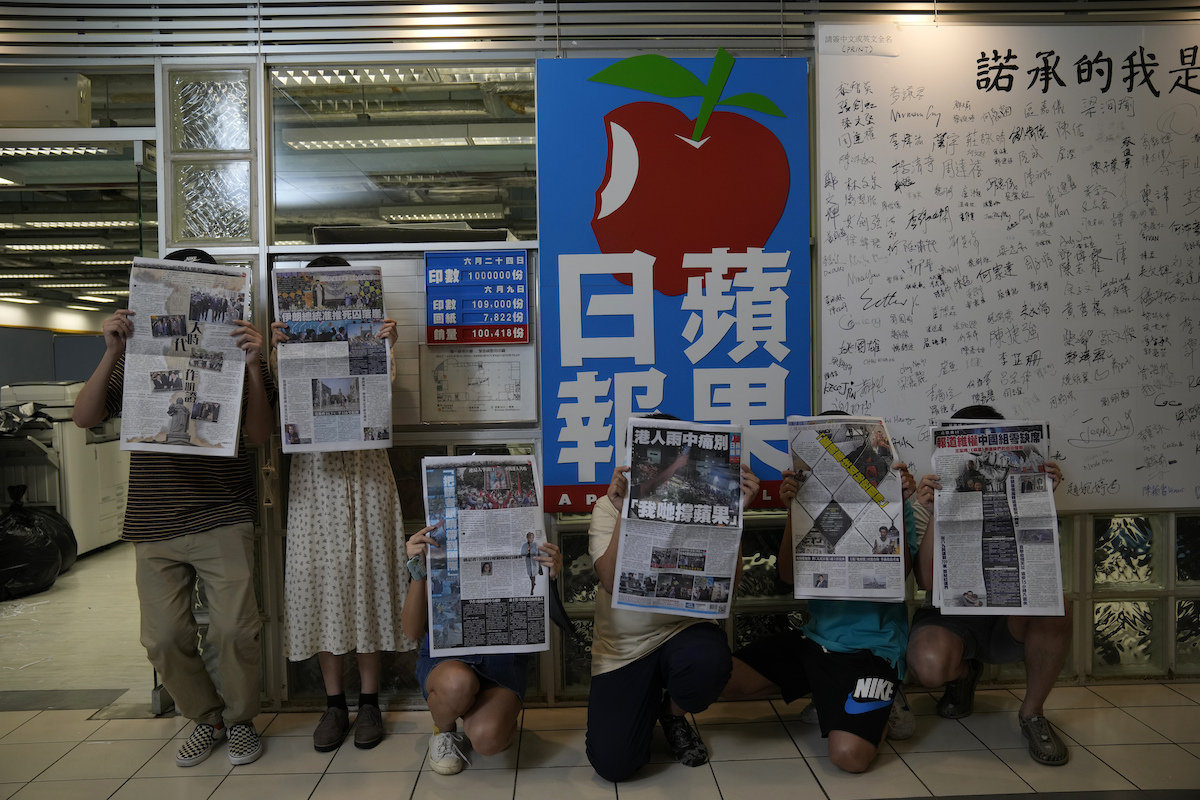Hong Kong pro-democracy news service Apple Daily shut its doors on June 24, but the ripple effects from the Chinese Communist Party’s attack on the free press continue to reverberate. Seven former Apple Daily employees have been charged under the city’s National Security Law, or NSL, which bans what the government deems to be acts of secession, subversion, or terrorism.
Former Apple Daily employees spoke out about their concern on the deterioration of freedom in Hong Kong in an interview with Australian Broadcasting Corporation’s 7.30 program. Kai Lai Leung, Alvin Chan, and Elven Yu, three former reporters still living in Hong Kong, have either remained in the journalism field or fled to another career in order to protect their safety. Remaining in Hong Kong is not an option for all ex-Apple Daily employees, as some safety concerns are so great that pro-democracy journalists have fled the country.
“The NSL [is] the biggest damage to the whole industry,” former Apple Daily journalist Elvin Yu told ABC. “Nobody is safe.”
Yu left media after Apple Daily’s closure, and he predicts more media outlets will be forced to close.
Merely speaking out against the increasingly authoritarian government dynamics in Hong Kong is dangerous. Some of ABC’s questions could not be answered by the journalists because of the risk it presents to their lives as citizens of Hong Kong.
The three journalists interviewed described being afraid for their lives or the lives of people they know because of their involvement with Apple Daily. Hong Kong authorities are increasing the number of arrests made under the NSL, intimidating individuals, social groups, and businesses.
The 26-year-old newspaper shut its doors after Hong Kong police raided its headquarters and froze its assets, arresting chief editor Ruan Law and four others in the process.
The raid resulted in Apple Daily’s final edition that same week, in which it sold 1 million copies.
Former Apple Daily reporter Alvin Chan is one of the few who continued work as a journalist after his time at Apple Daily was cut short.
“What Hong Kong people [are] going through, as a journalist, this is a very precious chance for me to walk with them,” he said.
Nine people associated with Apple Daily have been arrested under the NSL. In addition, since its implementation in June 2020, over 150 people have been arrested for violating it. And the number continues to grow.
Seven of the nine arrested are convicted, including long-time Acton friend and founder of Apple Daily, Jimmy Lai. The Hong Kong government has been especially harsh on Lai, and he is currently serving a 14-month prison sentence on conspiracy to provide funding to a protest group, which then lobbied foreign forces to impose sanctions against China. He is also charged with participating in unauthorized assemblies – namely, the 2019 pro-democracy protests, which sparked the passage of the NSL. Lai could face up to life in prison.
“It is our responsibility as journalists to seek justice. As long as we … do not let evil get its way through us, we are fulfilling our responsibility,” Lai said in a letter sent to his colleagues from prison.
Some countries, including the United States, have publicly imposed sanctions on the Chinese figures and the government.
The Biden administration announced last month that it would extend a safe haven to Hong Kong residents, recognizing the city’s undermining of democratic freedom and the danger it presents to its citizens.
Hong Kong politicians continue to turn a blind eye to the deterioration of human rights.
Paul Tse, a pro-Beijing politician in Hong Kong’s legislative council, claims Apple Daily is “… guilty of inciting other countries, foreigners, to sanction Hong Kong, to sanction the Chinese government, to do this and that, in a way to topple the Hong Kong administration.”
“Like most other national security laws elsewhere in Australia, in the U.S. or what have you, these laws are meant to be tough and meant to be very extensive,” he told ABC.
Hong Kong elites are unphased by the complete refusal of consideration to Hong Kong citizens’ collective pleading for a democratic system, which was promised when sovereignty was handed over from British rule to the People’s Republic of China in 1997.
The “one country, two systems” deal was meant to offer some autonomy to Hong Kong, but the Hong Kong government would rather offer a pseudo-autonomous policy to maintain as much control as possible.
Hong Kong society moves further from the democratic ideals it once respected. With the respect of democracy gone, so too is its respect for its people.
The three journalists have firsthand experience of a media environment that is rapidly deteriorating. If the past year under the NSL is any indication of the kind of society Hong Kong elites promote, freedoms of speech, press and expression have no chance of thriving.

